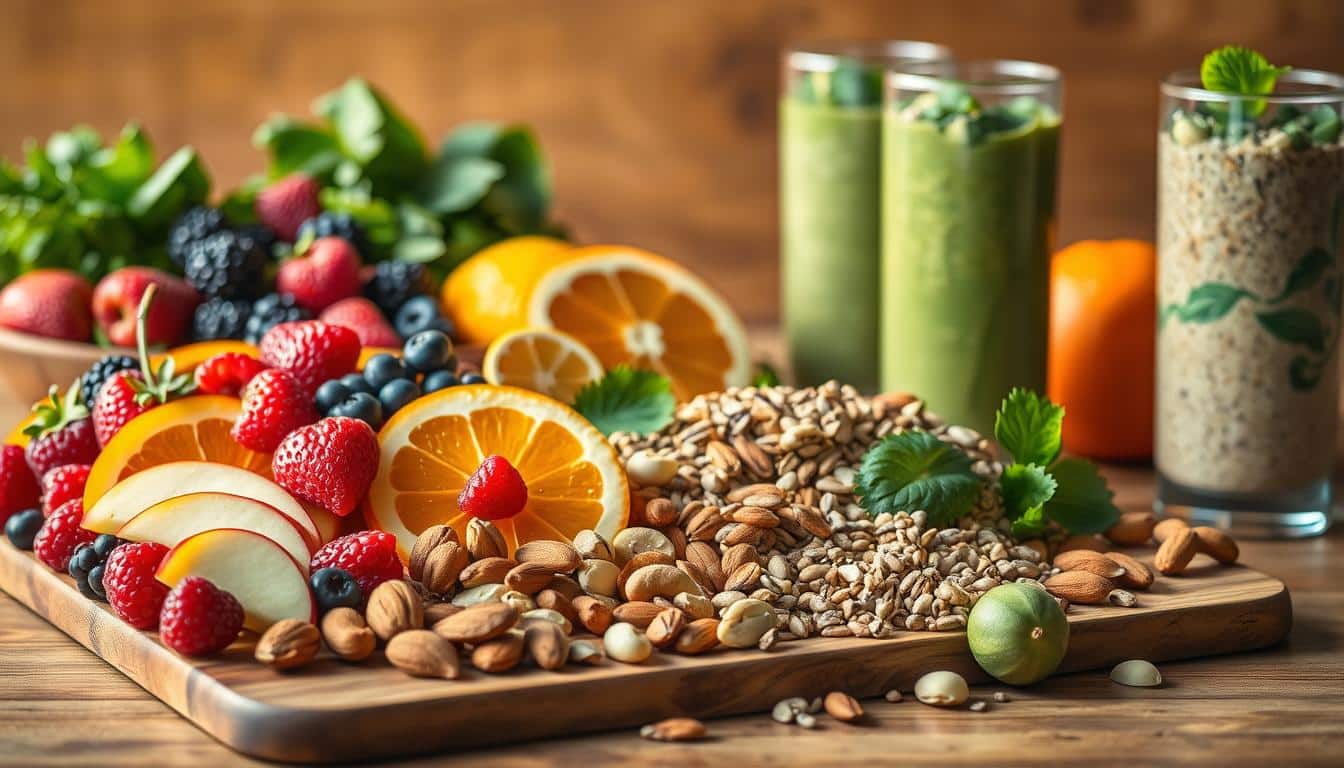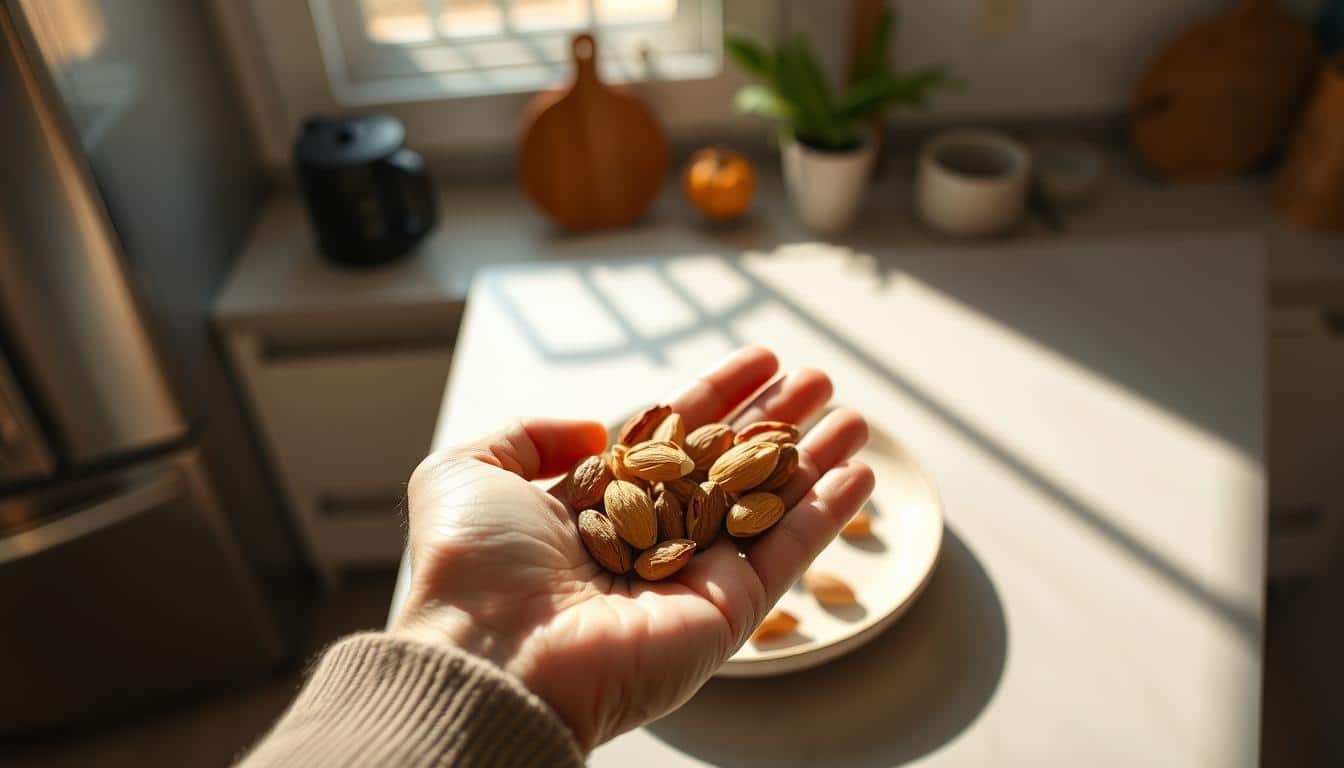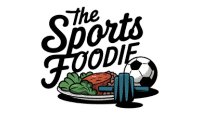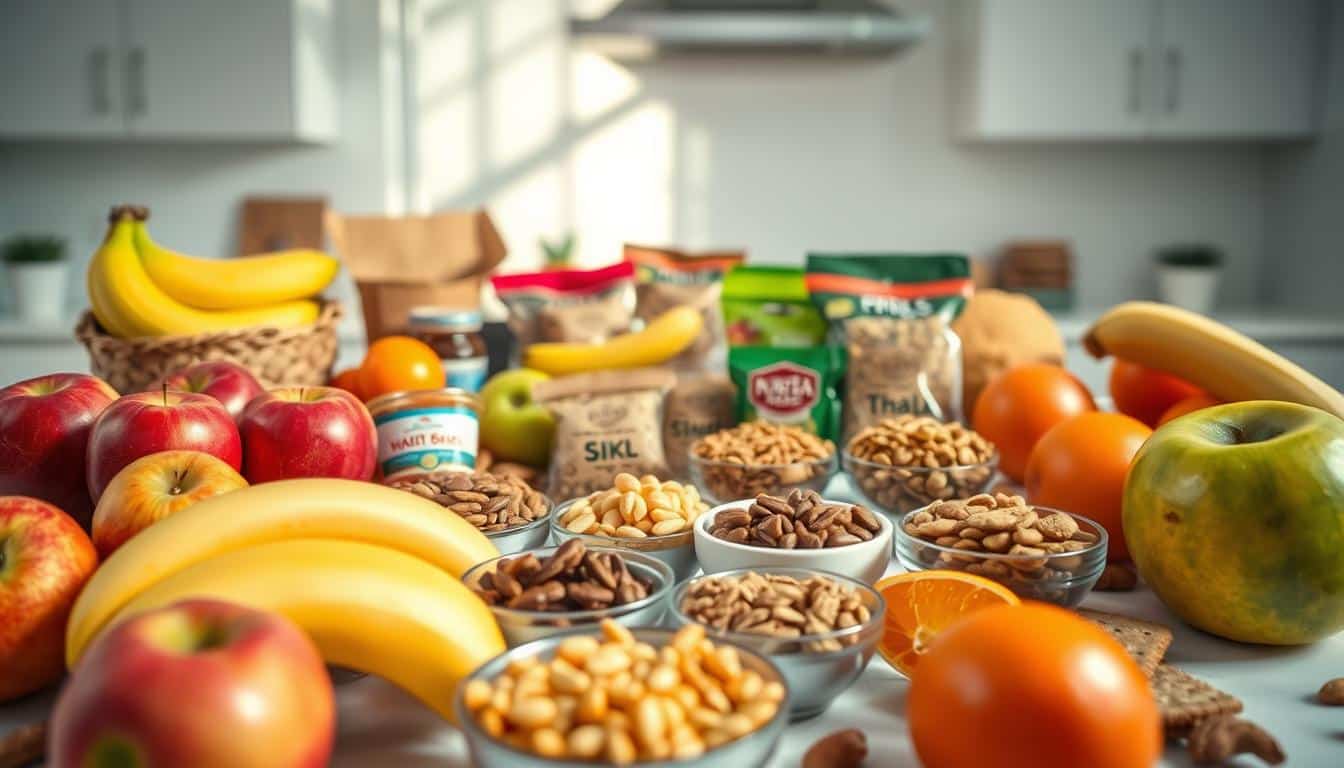Want a simple plan that fuels you all day and boosts performance? I’ll show you easy food choices that fit training and budget. You’ll get clear reasons each snack helps energy and recovery.
You should eat every 2–3 hours to meet higher energy needs. Carbohydrate-rich options top up muscle glycogen. Protein-rich picks aid repair and keep you full.
Post-workout focus matters. Aim for carbs plus protein within 30–45 minutes. Delay recovery foods by two hours and you can cut glycogen replenishment by half.
This guide lists practical options like yogurt and cheese, quick grains, and fruit. I keep prep simple and suggest store-brand swaps so you spend less time and money.
Ready to pack smarter and train stronger? Read on to see what to eat before, during, and after workouts so you never miss a key snack that protects performance and health.
Why affordable athlete snacks matter for energy and performance
Short, regular fuel stops keep energy steady during a busy training day. You refuel every 2–3 hours to meet higher needs. That timing helps avoid low blood sugar and mid-practice fatigue.
Carbohydrates refill muscle glycogen. That lets you train hard without an early drop in power. Protein supports muscle repair and lowers soreness after tough sessions.

Keep fiber light near workouts so digestion stays easy. Plan the snack and the time you’ll eat it. This simple pattern supports long-term health and performance.
- Snacks give athletes steady energy across the day.
- Protein plus carbohydrates aid recovery and next-session performance.
- Young athletes benefit from packable options during travel and practice.
| Quick Combo | Why it works | When to eat |
|---|---|---|
| Yogurt + fruit | Protein and carbs for fast recovery | Within 30–45 minutes post-workout |
| Crackers + cheese | Simple carbs with protein to sustain energy | Mid-practice or between sessions |
| Milk + banana | Easy carbs and protein, portable | Pre- or post-training |
Simple snack timing rules that prevent fatigue
Follow clear timing and portion rules to keep energy steady all day. Use a clock, pick easy-to-digest options, and match intake to session length.

Pre-workout: 30–60 g carbohydrates 30–60 minutes before
Eat a pre-workout snack 30–60 minutes before you train. Aim for 30–60 g carbohydrates to boost energy. Pick low-fiber, low-fat carbs so you do not get stomach trouble.
During workouts over one hour: 30–60 g per hour
When a session lasts more than one hour, fuel 30–60 g carbs per hour. For efforts over 2.5 hours, raise intake to 60–90 g per hour. Keep choices portable so you can eat on the move.
Post-workout: carb-to-protein focus for recovery
After training, pair carbs with protein at roughly a 3:1 ratio. Eat this recovery snack within 30–45 minutes. A two-hour delay can cut glycogen refill by half and hurt the next session.
- Match fuel to session length so you stay strong through the whole workout.
- Keep snacks simple and portable to avoid missing the window.
| Stage | Target | Why it works |
|---|---|---|
| Pre-workout | 30–60 g carbs, 30–60 min before | Quick energy without gut issues |
| During | 30–60 g/hr (60–90 g/hr if >2.5 hrs) | Maintain power and delay fatigue |
| Post-workout | 3:1 carbs to protein, within 30–45 min | Speeds glycogen refill and repair |
Cheap healthy snacks for athletes
A few versatile grocery picks give you quick energy and solid protein between sessions. These items keep prepping fast and costs low. I’ll show pantry picks, fridge staples, and simple add-ons you can mix and match.
Low-cost pantry picks
- Stock crackers and pretzels as fast carbs before training.
- Keep oats for instant oatmeal cups you can make anywhere.
- Use rice cakes as light, low-fiber bases for quick energy.
Budget fridge staples
- Buy yogurt by the tub to save per cup.
- Keep milk and hard-boiled eggs ready as portable protein.
- Choose cheese and cottage cheese for protein and calcium.
Value add-ons
- Add peanut butter or sunflower butter to boost calories and taste.
- Sprinkle pumpkin seeds for iron, magnesium, and crunch.
- Shop store-brand items to cut grocery costs without losing quality.
| Item | Benefit | When to use |
|---|---|---|
| Crackers / Pretzels | Fast carbs | Pre-training |
| Yogurt / Milk | Protein + carbs | Post-training |
| Peanut butter / Seeds | Calories, protein, minerals | Between sessions |
Best pre-workout snack ideas under five dollars
A small, timely bite can make the difference between an okay workout and a strong one. Pick a simple option that gives 30–60 g of carbs and digests easily. These choices cost under $5 and are quick to grab or pack.
Fast carbs
- Banana or two applesauce cups — ~25–40 g quick carbs.
- Fig bars or an instant oatmeal packet — portable energy that hits the target.
- Single-serve cereal bowl with a splash of milk in a cup for a steady carb boost.
Savory options
- Pretzels or graham crackers when you want a low-fiber bite.
- Two toasted waffles with jam — adds 40–50 g carbs.
- Add a spoon of peanut butter to waffles if you want a touch more protein and staying power.
Light sips
- Sip a small sports drink or 8–12 oz juice when you need instant energy and electrolytes.
- Skip heavy protein right before the session to avoid gut issues.
| Choice | Carb estimate | When to use |
|---|---|---|
| Banana | 25–30 g | 30–60 min pre-workout |
| Fig bar / instant oatmeal | 30–40 g | Quick, portable pre-session |
| Pretzels / graham crackers | 20–35 g | Savory option to avoid sweetness |
| Waffles + jam (with peanut butter option) | 40–50 g | When you need more sustained fuel |
These options give busy athletes an easy way to top up energy without overthinking. Pack two choices if your session is long or intense. You’ll be ready to perform your best.
Smart during-workout fuel for endurance sessions
When your session will last more than an hour, plan bites that are easy to eat on the move. Aim for a steady rate so you keep power and avoid the crash.
Plan 30–60 g carbohydrates per hour for most long efforts. For very long rides or races, raise that to 60–90 g per hour.
Portable carbs that work
Use one small box of raisins (~34 g carbs per 1.5 oz) as a single mid-session hit.
Keep fruit snacks or mini honey waffles in a pocket for steady intake. Spread bites across the hour to avoid stomach overload.
Hot-weather and fluid picks
Freeze grapes to cool your core and get carbs at the same time.
Choose sports drinks with electrolytes and carbs to cover fluids and fuel. Take small sips of water between carbohydrate hits if you feel thirsty.
- Plan: 30–60 g carbohydrates per hour.
- Example: raisins box ≈34 g carbs; fruit snacks or waffles are portable and easy.
- Heat tip: frozen grapes cool and refuel.
- Hydration: mix sports drinks and water; adjust cup size to sweat rate.
- Salt option: pretzels work in cooler weather if they sit well.
- Protein: not needed during most sessions; keep focus on carbs.
| Fuel | Carb estimate | When to use |
|---|---|---|
| Small box of raisins | ~34 g per 1.5 oz | Mid-session, portable |
| Mini honey waffles / fruit snacks | 25–40 g each | Frequent small bites across the hour |
| Frozen grapes | 15–30 g per cup (varies) | Hot conditions to cool and refuel |
| Sports drinks with electrolytes | 20–60 g per cup depending on product | Combine fluids and carbs; sip often |
Recovery snacks that hit protein and carbs on a budget
Right after you finish, a small combo of carbohydrates and protein speeds recovery and readies you for the next session. Eat within 30–45 minutes to maximize glycogen refill and repair. A two-hour delay can cut glycogen replenishment by about 50%.
Cold, grab-and-go options
Drink chocolate milk in a cup for carbs, protein, and fluid in one simple choice.
Mix Greek yogurt with cereal to add leucine and fast carbohydrates. That combo supports muscle rebuilding.
Choose drinkable yogurt when you’re on the move; many single-serve bottles provide ~20 g protein.
Shelf-stable wins
A peanut butter and jelly sandwich on whole-grain bread gives steady carbs and easy protein at low cost.
Keep protein bars in your bag to top up protein if you miss reaching your target.
Jerky delivers 8–12 g protein per serving and works when refrigeration isn’t available.
Quick pairs that work well
Pair cottage cheese with fruit for protein, calcium, and quick carbs.
Have hard-boiled eggs plus a small cup of orange juice for morning sessions — it’s simple and effective.
- Timing: eat within 30–45 minutes after training.
- Carry two: pack two recovery options so you never miss the time window.
- Mix and match: combine a bar or jerky with a fruit or drink to hit carb and protein goals.
| Option | Protein (g) | Why it works |
|---|---|---|
| Chocolate milk (1 cup) | 8–10 | Carbs + protein + fluids in one drink |
| Greek yogurt + cereal | 15–20 | High leucine, fast carbs to refill glycogen |
| Peanut butter & jelly sandwich | 10–12 | Low-cost, portable carb + protein combo |
| Jerky | 8–12 | Shelf-stable protein boost when refrigeration is limited |
High protein bargains you can pack any day
Keep portable protein on hand so recovery and hunger are easy to manage. Small portions taste great and save time when you’re busy. Rotate animal and plant options to widen nutrients and keep meals interesting.
Animal picks that travel well
Canned salmon: ~19 g protein per 3 oz. Tuna cans or pouches are convenient, high in B vitamins and omega-3s.
Hard-boiled eggs: one egg ≈4 g protein. Pack two for an ~8 g boost. Cheese sticks add protein and calcium and fit a lunchbox easily.
Plant-forward options
Edamame: about 13 g protein per cup. Roast chickpeas for ~7 g per 1/2 cup cooked; they make a crunchy, stashable bite.
Firm tofu: roughly 9 g protein per 3 oz. Bake cubes and season quickly with salt and pepper for a mild, portable choice.
- Pack canned tuna or salmon as a top protein source that travels well.
- Keep two hard-boiled eggs ready for a quick 8 g protein boost.
- Add a cheese stick for protein and calcium on busy days.
- Roast chickpeas or bake tofu cubes to stash in your bag.
| Food | Portion | Protein |
|---|---|---|
| Canned salmon | 3 oz | 19 g |
| Edamame (cooked) | 1 cup | 13 g |
| Roasted chickpeas | 1/2 cup | 7 g |
Practical tips: Build small snack boxes with a protein and a carb for balance. Shop store brands or grocery outlets to lower cost. When you need speed, keep seasoning simple—salt and pepper work fine.
Want more quick ideas that fit teen and youth routines? See these quick teen options to expand your rotation.
Carbohydrate-rich snacks that restore glycogen fast
When you need to top up quickly, pick dense carbs that refill stores fast. These choices give clear purpose and easy serving ideas so you can act fast after a session.
Use dried fruit as a pocketable hit of fast carbohydrates. A small handful (about 1/4 cup) pairs well with a protein shake after hard work.
Granola adds dense carbs; try a single granola cup stirred into yogurt or milk to get quick fuel without overdoing sugar.
- Bagels: a whole bagel gives a solid carb load. Eat plain pre- or post-session, or pair with cheese for extra protein later in the day.
- Rice crackers: a light, low-fiber option that sits well before training. Pack a small stack when you want easy digestion.
- Trail mix: toss raisins with cereal and a few nuts for a balanced mix of carbs and fat. Keep portions to a small cup to match targets.
- Bars: use a protein bar when you need protein with carbs; choose one that matches your recovery goal.
| Food | Serving idea | Why it works |
|---|---|---|
| Dried fruit | 1/4 cup | Fast carbohydrates; pairs with protein shakes |
| Granola cup | 1 cup with yogurt or milk | Dense carbs; portable carb bump |
| Bagel + cheese | 1 bagel + 1 oz cheese | High carbs + added protein for later recovery |
| Rice crackers | 6–8 crackers | Low-fiber, easy digestion pre-training |
| Trail mix | 1 small cup | Mix of carbs and quick energy; customizable |
Practical tip: keep serving sizes simple. Spread peanut butter thinly on a bagel for more staying power on easier days. Mix and match to hit the carb target your workout demands.
Fiber, fats, and satiety: snacks that keep you full between meals
Small bites rich in fiber and fat help you stay satisfied between meals. Save these picks for times away from training so digestion and performance stay smooth.
Nuts and seeds that keep you full
Use nuts and seeds as a go-to when you need lasting fullness. Almonds give about 6 g protein per ounce and support heart markers and gut diversity.
Pumpkin seeds deliver roughly 8.5 g protein per ounce plus magnesium, zinc, and antioxidants. Sunflower seeds are a budget-friendly crunch to rotate weekly.
Nut butter pairings
Pair fruit or veg with a thin smear of peanut butter to combine fiber and protein. Two tablespoons of peanut butter give about 7 g protein.
Try an apple with a spoon of butter or celery spread with peanut butter when you want volume without high calories.
- Keep higher-fiber, higher-fat picks away from pre-workout windows.
- Portion into small bags so you don’t overshoot calories.
- Rotate seeds to cover different minerals across the week.
| Food | Portion | Protein | Key benefit |
|---|---|---|---|
| Almonds | 1 oz | 6 g | Steady energy, heart support |
| Pumpkin seeds | 1 oz | 8.5 g | Magnesium, zinc, antioxidants |
| Sunflower seeds | 1 oz | 6 g | Budget crunch, vitamin E |
| Apple + peanut butter | 1 apple + 1 tbsp | 3.5–4 g | Fiber + protein in one portable snack |
Hydration and sports drinks: what to sip and when
Match your drink to the workout length, heat, and performance goal. For short or easy sessions, plain water covers most needs. Sip regularly before, during, and after to stay steady.
During longer or hot workouts, use sports drinks that add carbs and electrolytes. They fuel working muscles and replace lost salt. In heat, aim to sip about 1 cup every 15–20 minutes, then adjust to thirst and sweat rate.
Choose coconut water when you want a light drink with extra potassium. After tough sessions, try tart cherry juice to help lower soreness and speed recovery. If you only have juice, include a small amount of protein soon after to aid repair.
- Water — daily use and short sessions.
- Sports drinks — long or hot training for fluids, carbs, electrolytes.
- Coconut water — potassium boost in a light option.
- Tart cherry juice — recovery aid to reduce soreness.
| Situation | Best drink | Quick tip |
|---|---|---|
| Short session (<60 minutes) | Water | Top up before and after; sip as needed |
| Long or hot session | Sports drinks | Sip 1 cup every 15–20 minutes; replace electrolytes |
| Recovery | Tart cherry juice or coconut water + protein | Add a small protein source within 30–45 minutes |
Keep a bottle ready so you match intake to workout hours and intensity. If a sports drink isn’t handy on very hot days, add a pinch of salt to water. Test different options in practice to find the way your stomach tolerates best.
Vegan and dairy-free snack options that support performance
Plant-based choices can match dairy when you pick complete proteins and smart pairings. Pick options that combine soy, legumes, and seeds to cover amino acids and speed recovery.
Keep it simple. Use soymilk as your drink base; one cup adds about 7–8 g protein and helps recovery after training. Add it to smoothies or chia pudding to boost protein per serving.
- Edamame — ~13 g protein per cup; eat warm or toss in a trail mix with pumpkin seeds.
- Tofu — bake seasoned cubes for portable, savory bites (~9 g per 3 oz).
- Hummus + pita chips — combines carbs and plant protein; good between sessions.
- Dates + almond butter — fast carbs and fats to extend energy on the trail or during travel.
- Vegan bars — choose ones with clear protein blends and low added sugar.
Practical tips: rotate soy, legumes, and seeds across the day to cover amino acids. Pack a mix of edamame, pumpkin seeds, and a few dates so you always have a recovery option that tastes good and works.
| Food | Portion | Why it works |
|---|---|---|
| Soymilk | 1 cup | 7–8 g protein; milk alternative to support repair |
| Edamame | 1 cup | ~13 g protein; vitamins and portable carbs |
| Tofu cubes | 3 oz | ~9 g protein; bakes well for a savory snack |
| Chia pudding (made with soymilk) | 1 serving | Omega-3s plus added protein when mixed with soymilk |
Gluten-free snack options for athletes
Gluten-free choices can be simple, tasty, and ready to grab between sessions. I aim to keep swaps clear so you don’t overthink packing. These picks focus on portable carbs and protein that travel well.
Quick pairings that work
- Pair rice crackers with a tuna packet for fast protein and easy chewing.
- Add a jerky stick plus a string cheese for a savory, portable protein combo.
- Enjoy a gluten-free bagel spread with cream cheese and jelly for dense carbs after long sessions.
- Pack yogurt pouches when you want cold yogurt on the go.
- Choose cottage cheese with fruit to support bone health and recovery.
- Bring guacamole with corn chips for calories, fats, and flavor.
Quick tips
- Keep a gluten-free bar in your bag as backup.
- Read labels on sauces and bars to confirm gluten-free status.
- Balance each snack with carbs and protein to support training.
- Test choices on practice days, not on race day.
| Combo | Main benefit | When to use |
|---|---|---|
| Rice crackers + tuna | Fast carbs + 20–25 g protein | Pre- or post-session |
| Jerky + string cheese | Savory protein + calcium | Between sessions |
| GF bagel + cream cheese + jelly | Dense carbs for glycogen refill | Post-long workout |
| Yogurt pouch or cottage cheese + fruit | Cold protein + carbs, easy digestion | Immediate recovery window |
Bedtime snacks for better recovery and early training energy
A small evening bite can speed repair and help you wake with more fuel. Casein is a slow-digesting milk protein that releases amino acids over several hours. That steady supply helps with overnight muscle repair and reduces morning soreness.
Casein-rich ideas
Use cottage cheese at night for slow-release protein. A half-cup provides lasting amino acids without a heavy meal.
Choose yogurt (Greek style) when you want a creamy, high-protein option. Make a simple protein pudding with Greek yogurt and a scoop of protein powder. Add a little chocolate if you like.
Carb-forward ideas
Rice pudding offers easy carbohydrates that may support sleep via serotonin pathways. Pop a small bowl of popcorn when you want a light carb before bed.
Toast an English muffin and spread a thin layer of almond butter to combine carbs and fat for steady morning energy. If you train early, include a small cup of carbs the night before to top off glycogen.
- Timing: finish the snack 30–60 minutes before bedtime.
- Portions: keep servings moderate so sleep isn’t disrupted.
- Rotate: try cottage cheese, yogurt pudding, or a carb cup to see what helps you rest and recover best.
| Option | Typical serving | Why it works |
|---|---|---|
| Cottage cheese | 1/2 cup | Slow casein protein; overnight repair |
| Greek yogurt protein pudding | 1 cup | High protein; filling and mixable with chocolate |
| English muffin + almond butter | 1 muffin + 1 tbsp | Carbs + fat for sustained morning fuel |
| Rice pudding / popcorn | 1 small cup | Light carbohydrates to aid sleep and top off stores |
Smart shopping tips to cut costs without cutting nutrition
A little upfront prep cuts cost and keeps fuel ready when practice hits. Small changes at the store and in the kitchen save money and time. Use the steps below to keep young athletes fed and focused all day.
Bulk, brands, and sales
Buy bulk nuts, dried fruit, and oats to lower the unit price. Choose store brands for similar nutrition at a lower cost. Watch sales on yogurt, milk, and cheese and stock up when prices drop.
Shelf-stable and portion prep
Keep shelf-stable bars and jerky in your bag to cover a busy day. Portion applesauce cups, trail mix, and nuts into small bags so packing takes seconds.
- Make a weekly peanut butter and bread station so you can assemble a snack in one quick move.
- Pick foods with fiber on rest days to help fullness without extra meals.
- Compare unit prices to find the best way to save across the month.
- Prep car, gym, and school packs so young athletes never reach for fast food.
| Tip | Why it works | Quick action |
|---|---|---|
| Buy bulk oats & dried fruit | Lower cost per cup; versatile carbs | Store in airtight jars |
| Stock shelf-stable bars | Reliable backup on busy days | Keep a few in each bag |
| Portion trail mix & nuts | Controls calories and speeds packing | Use small resealable bags |
Conclusion
Small, steady fuel choices make a big difference across a training week. Plan a pre-workout snack with 30–60 g carbs, fuel long sessions hourly, and eat carbs plus protein within 30–45 minutes after hard work.
Hydration matters: sip water or a sports drink depending on session length and heat. At night, casein sources like cottage cheese can support overnight repair.
Rotate yogurt, cottage cheese, and other protein sources. Keep a few trail mix bags and bars ready. Add peanut or other nut butter when you need extra calories.
Stay consistent. Small choices add up and lift performance and health over the season. Pick one new snack this week and make it part of your routine.


